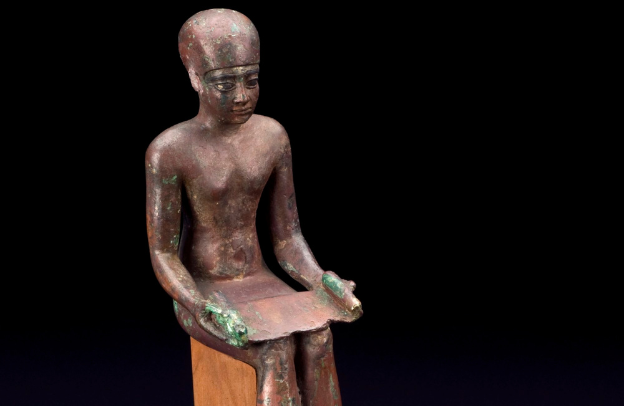5 Things That Made Imhotep One Of The Greatest Minds Of The Ancient World

On the pages of ancient history, amidst the grandeur of warriors, kings, and philosophers. But there exists a figure whose name resonates across millennia. His name is Imhotep, the ancient Egyptian multi-genius and one of the greatest minds in the ancient world. Known as “the one who comes in peace,” Imhotep was not a conqueror or a ruler in the traditional sense, but rather a scholar, architect, physician, and philosopher whose genius is undeniably resounding in the very fabric of ancient Egyptian civilization.
Want to learn more about storytelling? Start by downloading the first chapter of The Storytelling Mastery.
While the annals of time have often favored the valor of warriors and the sagacity of philosophers, Imhotep’s legacy stands as a testament to the transformative power of scientific inquiry and intellectual pursuit.
Imhotep’s Architectural Ingenuity in Pioneering the Pyramids
This is how it all began. Amid the Third Dynasty of the Old Kingdom, when pharaonic culture was still in its infancy, Imhotep rose to prominence as the chief architect and engineer of Pharaoh Djoser. It was under his guidance that the iconic step pyramid, Djoser’s eternal resting place, took shape on the African horizon.
Imhotep’s vision transcended the conventional norms of burial architecture, as he conceived a structure that would stand as a testament to the ingenuity of the human spirit. The step pyramid, with its towering tiers ascending toward the heavens, heralded a new era of monumental construction in ancient Egypt.
Yet, Imhotep’s innovation extended beyond mere aesthetics; it embodied a profound understanding of geometry, engineering, and theology. Each stone laid by Imhotep’s hand was imbued with the essence of eternity, a testament to his enduring legacy as the father of pyramid construction.
There is even more to the story. Imhotep was a Master of Medicine in line with the deep African medical knowledge and heritage, long before him.
The Healing Hands Imhotep, the Medical Maestro
Beyond the realm of architecture, Imhotep’s genius found expression in the healing arts. As the high priest of the god Ptah, Imhotep wielded not only the tools of ritual but also the instruments of medicine. His reputation as a healer transcended the borders of Egypt, earning him great respect in comparison to the Greek deity Asclepius.
You might also want to see African Presence In The Ancient World – Dr. Kiatezua Lubanzadio Luyaluka
Imhotep’s mastery of the human body, coupled with his deep understanding of herbal remedies and surgical techniques, made him a true pillar of hope in an age beset by affliction and disease.
Whether tending to the ailments of pharaohs or offering solace to the common folk, Imhotep’s compassion knew no bounds. His legacy as a medical maestro endures through the annals of history.
This is a testament to the timeless pursuit of healing and wholeness, a deeply rooted tradition that is still practiced among many African traditional medical practitioners today. That is not all, the ability of this African multi-genius is unparalleled, including his literary and intellectual legacy.
Imhotep’s Literary and Intellectual Legacy is Uncommon
In the halls of wisdom, Imhotep’s voice resonated with the clarity of a thousand scribes. Though much of the scrolls of his literary works have been lost to the sands of time, his intellectual legacy endures through the echoes of ancient texts and the whispers of scholarly discourse.
Imhotep’s role as a scribe and philosopher, ascribed by later Egyptian and Greek sources, speaks to the breadth of his intellect and the depth of his wisdom.
Whether penning treatises on architecture, composing hymns to the gods, or unraveling the mysteries of the cosmos, Imhotep’s words carried the weight of eternity and differentiated himself from his contemporaries.
Though the scrolls may have crumbled and the ink may have faded, the spirit of Imhotep’s intellectual inquiry lives on in the hearts and minds of scholars throughout the ages.
What could be the best way to celebrate this iconic personality with multiple abilities and accomplishments to his name than defying him? Well, that was what happened to this African multi-genius.
Deification and Devotion to Imhotep’s Divine Status
As the sands of time continued to shift, Imhotep’s legacy took on a new dimension, transcending the realm of mortal existence to become the stuff of legend and myth. In the twilight of ancient Egypt’s glory, Imhotep ascended to the pantheon of gods, revered as a divine being by Egyptians, the Greeks, and Romans alike.
His cult center near Djoser’s pyramid became a sacred sanctuary, where pilgrims sought solace and supplication in the presence of the divine. From humble beginnings as a mortal scholar, Imhotep’s journey culminated in apotheosis, his name enshrined in the annals of religious devotion for generations to come.
Though the sands of time may obscure the details, the essence of Imhotep’s divinity shines like a tall pillar, guiding the faithful through the darkness of uncertainty.
See also The Transpersonal Approach To Counselling By Professor Oluwafemi Esan
Well, it’s not all lost to the bygones. The spirit of Imhotep is renewed in the minds of modern scholars who are trying to understand the ancient and the role played by Imhotep in shaping their world, which has now become a foundation for understanding who we are in the world.
Imhotep’s Resurgence in Modern Scholarship
In the wake of Egypt’s conversion to Christianity and the subsequent eclipse of its ancient traditions, Imhotep’s name faded into obscurity, consigned to the annals of forgotten history.
Yet, like a phoenix rising from the ashes, Imhotep’s legacy experienced a renaissance in the modern era, as the discipline of Egyptology breathed new life into the study of ancient Egypt’s past.
Through the diligent efforts of scholars and archaeologists, Imhotep’s story was resurrected from the depths of oblivion, and his name was restored to its rightful place among the pantheon of ancient luminaries.
Today, as we stand on the threshold of a new age of discovery, Imhotep’s legacy serves as a fountain of inspiration, reminding us of the enduring power of human curiosity and the boundless potential of the human spirit.
This is the story of Imhotep, the African multi-genius and one of the greatest minds of the ancient world.
Want to learn more about storytelling? Start by downloading the first chapter of The Storytelling Mastery.





